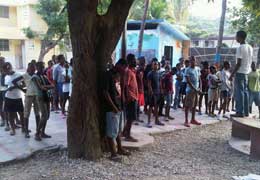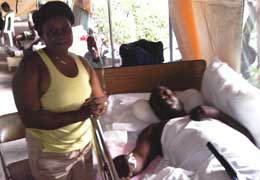Notes on Haiti - CEO Journal Part 10
Note: While serving a medical mission to Haiti, Scripps CEO Chris Van Gorder is writing dispatches about medical aid in progress, conditions on the ground and what can be done to help earthquake victims. For other journal entries, see the Haiti news page.
Well, it’s Tuesday, Feb. 2 in Haiti and things appear to be getting more organized every day. As I write this, Rob Sills is taking the small plastic packets of water which are designed for one-time individual use, and placing them in a larger container before we use our water purifiers — just to be safe.
It’s humid here and we want everyone to stay well hydrated. Heater Meals which we brought with us and MREs (Meals Ready to Eat) are the lunches — assuming we have time for lunch. The temperature is 89 degrees with 46% humidity with a UV index of 8, which is very high.
Last night we went to Patrick’s boarding school for a spaghetti dinner. The school normally has about 350 students, but right now, only one-third are at the school — all the rest have gone home to be with their families, as many lost family members to the earthquake. These children are described as the “poorest of the poor” and they are plucked out of the community because they have certain specific attributes and attitudes. The hope is that some of these children will change the direction of this country in the future.

The fact that these children were at the boarding school during the earthquake saved their lives. All of the students were safe at the school.
As I walked around, I had the chance to spend a few minutes with a young man who told me he was a senior. He said he has been at the school since he was 5 years old, but the school generally educates students between the ages of 12 to 18. I asked him what his father did and he said, “my father was assassinated.” I decided not to pursue the conversation further as it appeared to be an emotional topic. I did find out that this young man’s name was Gmaes Phillip Coqmerd and he wants to be an expert in languages. He already speaks Creole, a little French, Spanish and English.
During dinner, I had some time to speak with our orthopedist, Dr. Drew Peterson. Drew told me that this experience “is not what he had expected.” He went on to say that the Haitian patients and their family members “ask for nothing.” It is interesting and very different than patients in the United States. Patients don’t complain except in a few rare cases. The family members care for them and bring them food — they are not fed by the hospital — and given the number of patients and family members in the compound, it is generally quiet.
As I write this, our power just went off again. This hospital does not have external power yet. All of our power — and it is minimal — is supplied by the hospital’s generator. When we arrived this morning, it took us about 90 minutes to get the generator turned on so we had power for surgery. We have a case going on right now but we will adapt with battery-powered head lamps for the moment. And one of the University of Maryland surgeons is using Rob’s Leatherman tool to tighten the ex-fx on the ortho case. We adapt and do what we need to do.
As we did rounds this morning, we found that a woman, being cared for by a Haitian physician, had significantly deteriorated during the night. She was an older lady that we did not know much about. She probably had pneumonia, congestive heart failure and other issues. At home, we would have put her on a ventilator, but we don’t have any vents here. We thought she would pass away today so Luke, our NP liaison, told the nephew, the lone member of the family, about her condition. He was very sad. I’m told she just passed away.
As I walk around the compound at lunch, I see the family members bringing their stainless steel pots with meals for their relatives who are patients. Some have adopted other patients who don’t have families anymore and bring them food as well. Even in relative poverty, a certain amount of generosity still exists.
So far, we only have six surgical cases today although we already have six scheduled for tomorrow. Sometimes we find that our patients have eaten something even though we told them not to, and that delays the case to another day. We have also found that the Haitian nurses and family members don’t like wounds left open to heal in the air, as we would occasionally do at home. When we leave them open, we often return on rounds only to find that someone put a bandage on the wound anyway. Maybe that makes sense, given the number of flies in the open wards. So now we put loose bandages on the wounds to let air help in the healing process and yet still be sensitive to the environmental and cultural issues.
While we still spend most of our time with extremity orthopedic and wound cases, we did have an inguinal hernia case today. I think we had a race to see which surgeon would do the case, and I think Dr. Shackford won.
And my final story for today: Serge. Serge is a 66-year-old man, Haitian by birth but a resident of New York City. He was visiting family in Haiti when the earthquake hit. He sustained a fractured femur from falling debris.
He had an earlier surgery and repair but he needed additional surgery, so the University of Maryland crew did the surgery today assisted by Scripps personnel. Serge and his wife are Americans now and speak excellent English. They just happened to be at the wrong place at the wrong time. I could tell that they were relieved and thankful that American physicians and nurses were here to help him. Rob and I just took him from post-op to his open ward. Serge’s wife had the bed made perfectly — not a wrinkle in the sheet. As we left, Serge and his wife smiled. I’m sure they will be happy to get home. We will too when our mission is done.
